July/August 2019
Princeton in Africa would like to officially welcome the two newest members of our team: Resla Wesonga and Walter Lohmann. Resla, a recent Yale graduate, will be our new Outreach Coordinator. Walter, a recent PiAf Fellow, is joining PiAf staff as the Program Coordinator. See his article in this flyer to gain a better understanding of his transition from Fellow to staff. We cannot wait to see the ways in which they strengthen and grow Princeton in Africa’s work.
As we welcome new staff, we are finalizing preparations for the 20th Anniversary Gala! 20 years ago, PiAf started with two Fellows working with one organization, the IRC. Today we have 48 Fellows working with 31 different organizations across 19 different countries. Learn more about this celebration on our brand new website at princetoninafrica.org/about/annual-gala.
In all of this excitement, we have not forgotten our Fellows. This will be the last flyer highlighting the 2018-19 Fellows, as the final members of the 2019-20 set off to begin their fellowship year. Meanwhile, we are also preparing for the next cohort of Fellows. The application for 2020-2021 Fellows is now live. Let all of your senior and recent graduate friends know to apply! Application closes October 30th.
PiAf Connections
Please click below to check out pictures of our Fellows, Alums and other members of the PiAf family meeting up at home and around Africa.
Notes from the Field
By Sachi Twine, '18-'19 Fellow with Global Partnerships in Kenya
Here in Nairobi, I’m in the last month of my fellowship with Global Partnerships (GP), a non-profit impact investor focused on supporting market-sustained solutions to development challenges. From GP’s regional office, we aim to direct capital to high impact organizations and social enterprises across Sub-Saharan Africa.
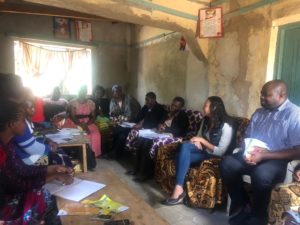
Sachi and her coworker, Aaron, attending a group lending meeting with a micro-finance partner in Nairobi.
Global Partnerships works across 17 different investment initiatives, areas we’ve identified as high impact and investable through literature reviews, case studies, and market research. These initiatives range from solar lights to smallholder farmer inputs to women-centered micro-finance, and we use them to help ensure our funds are reaching people in our target market—those living below the international poverty lines.
In my role as GP’s Research and Impact Associate, I’ve had the opportunity to shape the future of our portfolio by supporting the development of investment initiatives. My team investigates challenges, researches effective interventions, and opens new opportunities for GP investments by defining the criteria and best practices we will look for in partners in those spaces. We define the target beneficiary and desired end results of the interventions—often smoothing, increasing, or diversifying income, or facilitating access to products and services that bring demonstrable improvements in quality of life. And we seek to do all of this while keeping in mind the dramatic differences in local context across the countries we invest in.
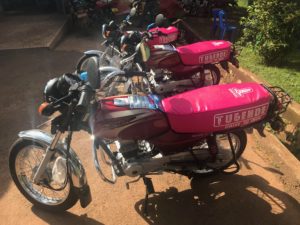
Brand new motorcycles for clients at Tugende, a GP partner in Kampala, Uganda.
Last fall, I helped define a Productive Asset Finance initiative targeting micro-finance institutions and social enterprises that offer tailored loans for income-generating assets, such as motorcycles or livestock. In most cases, their clients do not meet the lending requirements of traditional banks, and many have no experience at all with formal financial institutions. Through Productive Asset Finance, GP hopes to expand financial inclusion and help micro-entrepreneurs and small-scale producers gain access to assets that will allow them to operate their business more efficiently, produce more goods, or reach more customers.
In June, I visited Tugende, our first Productive Asset Finance partner, in Kampala, Uganda. Tugende offers boda boda (motorcycle taxis) drivers lease-to-own motorbikes. With bright pink branding and the slogan “be your own boss,” Tugende has removed the barriers to ownership that keep most motortaxi drivers renting bikes for steep fees—sometimes up to half of their daily earnings. By paying off their motorcycles within 2 years, Tugende customers ultimately increase their net income by an estimated 45%. With that additional income, they’ve have reported investing in land, livestock, or another business.
As an impact-first investor, Global Partnerships hopes to expand its reach, both geographically and across sectors, while continuing to broaden opportunity for the end clients across its portfolio. With my time in the Nairobi office coming to an end, I look forward to seeing where GP goes next!
Notes from the Field
By Elijah Scott, '18-'19 Fellow with Legal Resource Centre in South Africa
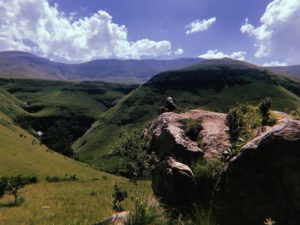
Stopping for a short rest in the Drakensberg near Tugela Falls
I’ve been living in Johannesburg for 10 months now, and my experience has been an incredible opportunity for learning in the office and in my travels. I am working at the Legal Resources Centre (LRC), a human rights legal organization where I conduct legal, regulatory, and public policy research to advance human rights advocacy and support constitutional litigation. The LRC is celebrating its 40th anniversary, and since its inception as a law clinic and impact litigation firm, it has become the largest public interest and human rights law firm in Africa. Because of the 40th anniversary, my current work has been profiling the LRC’s most influential cases, advocacy campaigns, and lawyers over the past 40 years, but the current and future work that the LRC is doing is just as significant for improving the lives of South Africans.
One of my projects in the past ten months was presenting at workshops on the legal rights afforded to mining communities to refuse mining on their land. I presented to groups of over twenty activists in Marikana in the North West Province who had been personally affected by mining such as mine blasting in the middle of the night, and contaminated or irregular drinking water that was interrupted or contaminated by mining activities. It was rewarding to engage with them throughout the workshop so that they could take new strategies and actions to their communities to challenge the illegal activities of mines. The presentations were part of a larger series of workshops across the country in mining-affected communities such as Marikana, Khayelitsha, and West Coast to inform activists and community members of the rights with regard to the mining companies operating on or near their land.
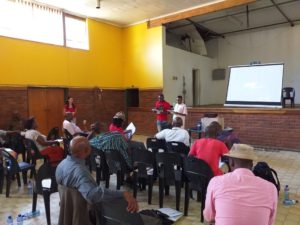
Two activists share their strategies for challenging illegal mining activities in their local community at a workshop in Marikana
In addition to my work presenting at workshops, I have also helped to organize two major round table conferences in Johannesburg in the past two months. The first round table was a meeting of activists and workers in the artisanal mining sector that featured academics and lawyers intended to educate the artisanal miners on how to lobby for the decriminalization of the livelihoods. This conference also allowed artisanal miners and community activists from mining-affected communities across South Africa to have a platform to share their grievances as a collective group and potentially unionize. In a similar manner, the LRC hosted a round table conference on what the right to food means in modern South Africa, and it was attended by various academics, practitioners, lawyers, and community activists from across South Africa and the world. The goal of the conference was to develop a legal strategy for bringing a test case before the South African courts in order to force the government to clearly define how the right to food would be operationalized.
My work in presenting and organizing such conferences has allowed me to learn more about the interaction between movement building amongst activists and organizers and litigation strategies and accompanying research of lawyers and researchers. As the LRC celebrates its 40th anniversary and I have been able to look back on the accomplishments of the organization since 1979, I am looking also forward to the crucial work in advocacy campaigns and human rights litigation that the LRC will do for the next 40 years in shaping the future of South African society in an inclusive and progressive way.
Notes from the Field
By Sarah Baum, '18-'19 Fellow with with Population Services International in South Africa
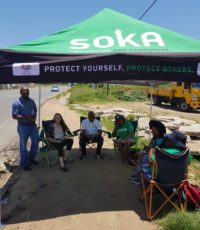
Sarah with Male Circumcision mobilizers in the field in Durban after a DHIS2 training
The shifting landscape from Chipinge to Bulawayo intersperse hours of reviewing paper based records as part of a Data Quality Audit we’re conducting for the HIV Self-Testing Africa (STAR) Initiative in Zimbabwe. Amidst the bustle of the clinic and the thousands of paper records, auditing can quickly delve into mindless tabulating. Reconciling inventory stock cards against self-test kits used. Populating a testing cascade from people tested, to positives, to linkage to HIV treatment or prevention. Seeing where targets are or aren’t being met.
Accuracy, integrity, and precision are three of the five key pillars of data quality at PSI and they are at the heart of demonstrating impact. This drives donor investment, buy-in from ministries of health, and program scale-up. My role as a Regional Research, Monitoring and Evaluation Fellow with PSI has shown me that impact cannot be conveyed in numbers or targets alone.
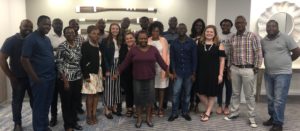
PSI colleagues from Southern Africa and Nigeria at the Regional Data Quality Audit Training in February
In May, I attended pilot interviews for research we’re doing on the demand for long-acting implantable HIV pre-exposure prophylaxis (PrEP) in South Africa. The accounts of three different women—an adolescent, a female sex worker and a provider—provided such different insights into whether this device would fit in to their livelihoods or the livelihoods of their clients, what characteristics mattered to them and what would ultimately affect their decision to uptake PrEP, and specifically in this form. Where M&E traces the journey of those we serve, research provides the understanding of what that journey and the choices leading up to it entail. So in lies meaning and impact.
How we derive and communicate meaning from numbers in the field of health is something I’ve reflected on even before stepping foot into the PSI office in Johannesburg. Yet, my unique experience collaborating with program, research and M&E staff has shown that it cannot be done in isolation nor without retaining those we serve at the forefront of the work that we do. Navigating this balance is something I will continue to reflect upon during upcoming audits in Zambia and Malawi, and following my fellowship with PSI.
Notes from the Field
By Alumni, Walter Lohmann, '18-'19 Fellow with Maru-a-Pula in Botswana
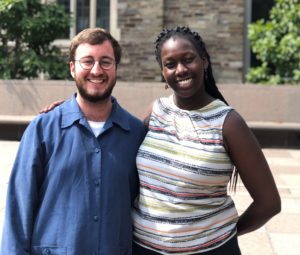
Walter and Resla
Greetings, PiAf family! It’s been a whirlwind few weeks since I left my post at Maru-a-Pula (MaP) School in Gaborone, Botswana, but now I am entering my second week as a member of the Princeton in Africa Staff. My year at MaP was incredibly positive; I am so grateful to PiAf, the 18-19 cohort, and the MaP community for making me feel so supported and welcome throughout my fellowship. I can see already that in many ways, adjusting to working at PiAf will be similar to settling in at my host organization.
When I arrived to teach at MaP, I was overwhelmed and lacked confidence in the classroom. My first lesson consisted of a twenty-minute activity, followed by a twenty-five-minute improvised class discussion. However, during the three-week handover between me and my predecessor, Emily, and as my fellowship progressed, I learned valuable lessons and experienced professional growth every single day. By the time I reached the end of my year, the classroom felt like home and the faculty, staff, and students of MaP became family. Going into the year, I had no idea what to expect, but I came to find myriad sources of joy and gratitude in my everyday life both professionally and socially. Some of my favorites include feasting on Indian food with the other Botswana PiAfs, rowing on the Gaborone Dam with my students, and spending Sundays hiking and brunching with good friends.
Now, in my second week as PiAf Program Coordinator, I can say again that there is a lot to get used to. So much thought, care, and time is put into every stage of the fellowship process that work is, at times, overwhelming. Despite that, I have already found many sources of joy here in our Princeton offices- my new coworker Resla, supervisors Jodi, Michelle, and Reanne, our interns, and the wonderful 19-20 cohort to name a few! Although I already miss driving my Honda Fit on the left side of the road, calling my Form 2K’s names at attendance, and chatting with my colleagues at morning tea, I am lucky to have a job where I remain engaged with the warm and empowering Princeton in Africa community.




